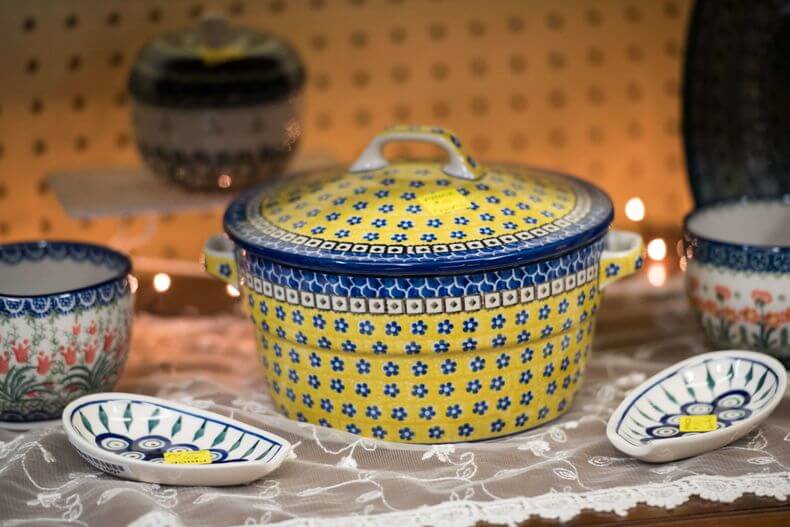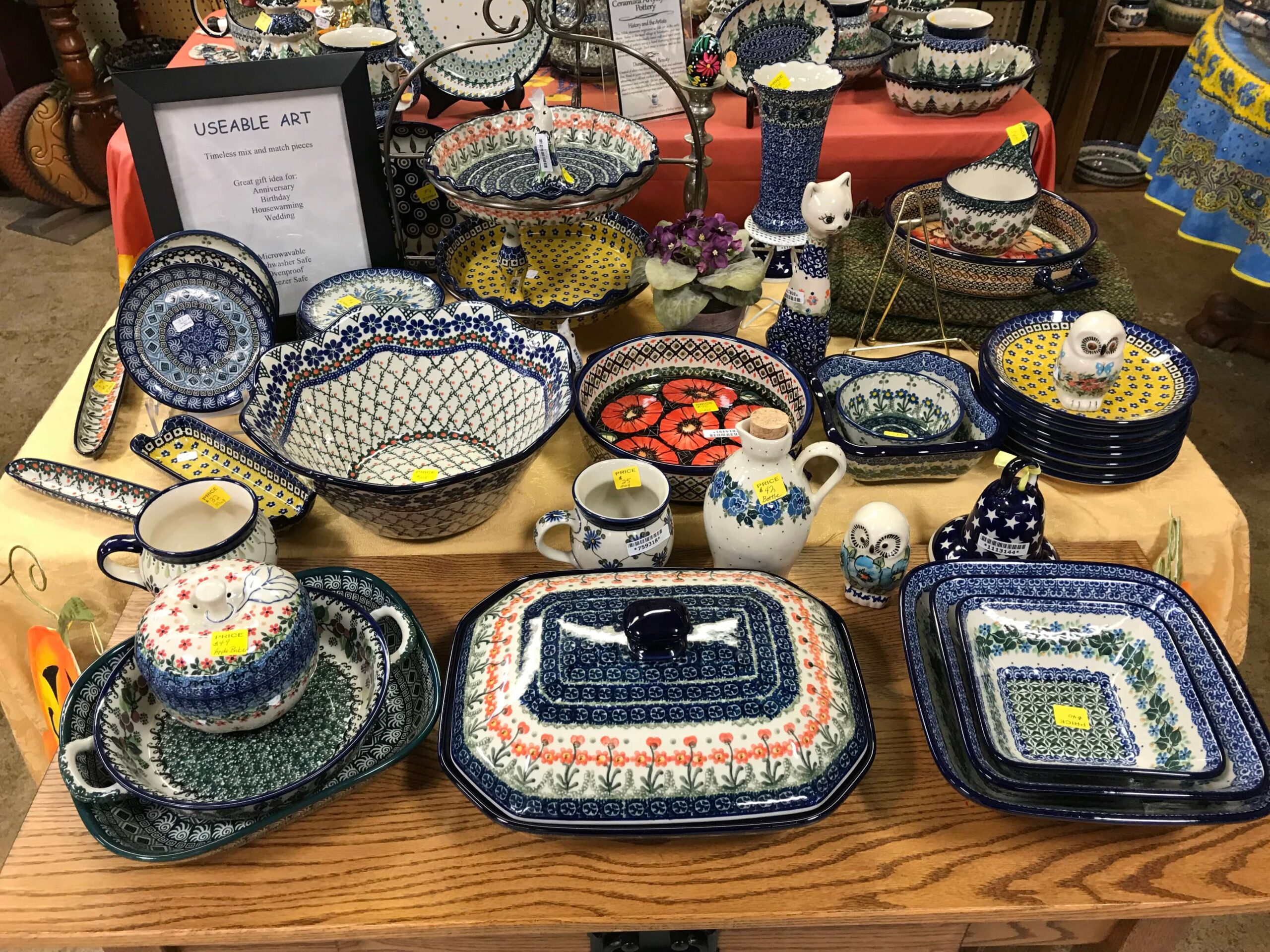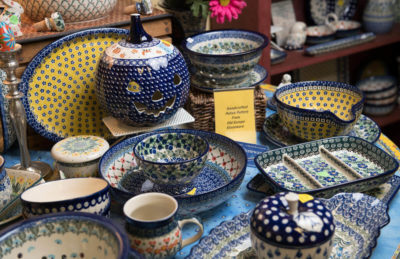
Any good cook knows that the tools you use are just as important as your ingredients and recipe. That’s why so many people pick stoneware pieces for baking, roasting, and other kitchen delights. And with proper stoneware care, you can continue to use your favorite dishes for years to come (and even pass them down to future generations). Keep reading to learn how to care for stoneware and other important FAQs.
What is stoneware?
Stoneware is a type of nonporous cookware that can transfer heat evenly for perfect cooking every time. The creation process is similar to traditional pottery, but with a much stronger end result. This is because it’s made of non-refractory fire clay and is fired at a much higher temperature than earthenware (between 2,200 and 2,800 degrees Fahrenheit).
This gives it a stone-like quality that’s heavier and more solid than an earthenware piece. The firing process also makes the clay waterproof, so it doesn’t need to be glazed. Unlike porcelain or china, stoneware is a thick dish that doesn’t chip easily.
Stoneware is popular for baking dishes, oven stones, plates, bowls, mugs, and beyond.
Benefits of Using Stoneware
Stoneware has been used for thousands of years. From its origin in China to being featured on the Food Network, it’s been making waves through the centuries. Here are some of the biggest reasons why:
- Stands the test of time, making it a worthwhile cooking investment.
- Chips less easily than other pottery options.
- Heats evenly across the surface and retains heat well.
- Creates crispy crusts, moist interiors, and perfectly browned finishes.
- Provides a toxin-free cooking option (no lead or chemical coatings here!).
- Avoids retaining odors from foods like fish.
- Upgrades any holiday dinner or hosting event.
With these perks in mind, let’s explore how to care for stoneware so you can give your pieces a chance to build up their own rich history in your kitchen.
How to Care for Stoneware and Other FAQs
How Do You Clean Stoneware?
The key to proper stoneware care is to always make sure you bring it to room temperature before cleaning. Rapid temperature changes can cause thermal shock, which can lead to cracks and warping.
Next, we recommend gentle cleaning methods. While most pieces can go in the dishwasher, handwashing is always the safest bet to maintain their original appearance.
For soap, avoid using any citrus juices or citrus-based cleaners that can dull the gloss. Make sure you read your detergent label carefully! Also avoid metal scrubbing pads that can scratch the surface. Instead, use a sponge or cloth and a nylon scraper to remove stuck food.
Can Stoneware Go in the Dishwasher?
As we mentioned, most stoneware pieces are dishwasher safe, but not all. Typically, if your piece is not glazed or from an unknown origin, you should handwash it. Remember to consult any instructions that come with your purchase, and when in doubt, skip the dishwasher and use the stoneware care instructions outlined above.
How to care for stoneware when loading the dishwasher is simple. Make sure your stoneware has completely cooled before throwing it inside, and only use mild detergents. If you’ve seasoned the piece, the dishwasher will remove that layer. In this instance, we also recommend handwashing.
Speaking of seasoning…
Do You Have to Season Stoneware?
Yes, seasoning unglazed stoneware is recommended. Start by baking a few rounds of higher-fat foods on your dishes. Over time, your piece will develop a natural nonstick coating as oils are baked into the pores of the dish. You’ll also notice the color start to change to a darker brown—this is totally normal!
This process creates a corrosion- and stick-resistant coating that makes it easier to clean off food. The speed of this depends on the foods you’re cooking. As you work to build up that layer, you may be tempted to use a nonstick spray in the meantime. We advise against this, since it can leave a sticky residue and slow down your seasoning progress.
If you’re wondering how to care for stoneware while keeping the seasoning intact, you’ll need to wash the pieces with hot water and no soap. If you have some food buildup that’s tough to clean, we recommend a good set of nylon pan scrapers. Look for a set with rounded edges so you can easily reach corners or tight spots. Soak your dish in warm water for half an hour and then scrape it clean.

Can Stoneware Go in the Oven?
Yes, stoneware is oven-safe, but you need to pay special attention to how you handle it. It’s perfectly safe to use for cooking, as long as you avoid rapid temperature changes.
However, that doesn’t mean you should put empty stoneware in the oven and preheat the piece. We advise against this since it will likely crack or break. Instead, let your oven finish preheating like normal. Then take your room-temperature dish and place it inside to cook.
If you’re making dense, frozen food like chicken or large cuts of beef from your local butcher, make sure they’re thawed first. However, if you’re popping in a pizza or bite-sized frozen foods, those are fine to spread evenly over the surface of your stoneware and heat up directly from the freezer.
In the same vein, don’t freeze a casserole in your stoneware dish and then pop it straight in the oven. That change from cold to hot can severely damage the piece. While you can absolutely freeze foods in the stoneware, you need to move it to the fridge and let it completely thaw before cooking.
Can Stoneware Go in the Fridge or Freezer?
Yes, stoneware can go in the fridge or freezer. It’s great for storing a frozen casserole or leftover soup. Just make sure it’s at room temperature before you pop it in. And when you’re ready to remove it, thaw it gradually by placing it in the fridge or on the counter before cooking.
Never put your stoneware directly from the fridge/freezer to the oven or vice versa. Similarly, don’t pour hot liquid directly into a cold dish. But as long as you’re careful about temperature changes and follow these basic stoneware care instructions, it’s perfectly safe to store your dishes in the refrigerator.
Can Stoneware Go in the Microwave?
It depends on the piece! Unless your dish is clearly labelled as microwave safe, you should avoid it. Some dishes have unusual glazes or decorations with trace amounts of metal, which can cause damage when microwaved.
Just like the oven, avoid extreme temperature changes that can lead to thermal shock. Don’t put your stoneware directly from the fridge to the microwave. Instead, let it warm to room temperature first.
Do You Have to Change Cooking Times?
The unique material of your dishes impacts stoneware care, but does it also affect your recipes? Many cooks have found that they can continue using the same baking times and temperatures as originally listed in their cooking directions.
The only time you may have to test adjusting the cook time is if you have a convection oven or a baking time of less than 10 minutes. In that case, you may want to add one to two minutes for a better result.
Can You Use Metal Utensils With Stoneware?
No, using metal utensils can damage the glaze layer on your dishes. Instead, use a gentler option like wood or plastic so you don’t scratch your set.
Can You Put Acidic Foods in Stoneware?
No, we do not recommend serving acidic foods in your stoneware. Foods with high acidity—like vinegar, citrus fruits, and tomato-based sauces—can degrade the glaze and ruin the color of your dishes.
Instead, put a liner between your food and the dish, or choose a different set to serve your food. If that’s not an option, remember to clean your stoneware immediately after use so they don’t have prolonged exposure to the acid. Always store any leftovers in a separate container.
How Do You Store Stoneware?
First, make sure your stoneware is completely dry before storing it. Don’t stack the pieces directly on top of each other, as that can cause scratches and damage the glaze. Instead, use a cloth liner between each item, and avoid placing heavy items on top of your stoneware. Store them in a cool, dry place away from any moisture or heat sources.
How to Care For Stoneware
Before and after each use, check your dishes for cracks or glaze chips. If you find any, do not use the piece moving forward. Cracks in the glaze can expose your food to bacteria, which is a health risk for you and your family. If you perform regular checks and follow all the tips we’ve outlined above on how to care for stoneware, your items will stay good as new for years to come.




